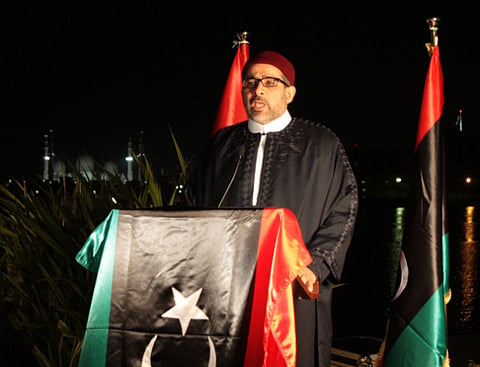Libya awaits positive freedom, ambassador says
Libya’s Islam is moderate and against radicalisation, ambassador says

Abu Dhabi: After accomplishing a “negative freedom”, Libyans are striving to achieve a “positive freedom”, Dr Aref Al Nayed, Libyan Ambassador to the UAE, has said.
“There are two types of freedom. One is negative freedom — simply being free from tyranny — that has already been accomplished another is positive freedom — building a functional country, safe for everyone, with equal status for all men and women from all regions of Libya,” he told Gulf News in an interview.
“It is the birth of a free nation that greatly contributes to humanity at large,” Al Nayed said on the sidelines of celebrations of the Libyan revolution here. Many Libyan expatriates attended a reception hosted by the embassy on Sunday evening.
The North African nation marked two years since the start of the revolt that toppled Muammar Gaddafi after four decades of iron rule. An initial protest on February 15, 2011 against Gaddafi’s rule ignited a massive revolt two days later. The anniversary of the uprising that ended with Gaddafi’s killing in October 2011 came while Libya’s new rulers are struggling to restore order in the country.
“The celebration is really a joy. It is also a deep appreciation of the martyrs and the injured who sacrificed for freedom,” the ambassador said.
The Libyans in the UAE are very excited and share the joy of their countrymen back home. They also express their gratitude towards this host country that has contributed towards the Libyans’ march to freedom, Al Nayed said.
The new Libya will have a special relationship with the GCC [Gulf Cooperation Council nations of Bahrain, Kuwait, Oman, Saudi Arabia, Qatar and the UAE], especially the UAE, he said. Unfortunately Gaddafi did not maintain deep relations with the GCC. Libya’s new government has opened embassies in all GCC nations. “It is a natural strategic alliance; we have one religion, one language and our interests are common,” he said.
The UAE and Libya have signed a framework agreement for mutual cooperation. Bilateral discussions on mutual cooperation in defence, transportation and various other sectors are progressing, the envoy said.
“The relations are quite promising. With our one-and-a-half-year presence in the UAE [since the opening of the embassy of Libya’s NTC or National Transitional Council] we look forward to strengthening the relations,” Al Nayed said.
About the Libyan economy, he said, the restarted oil production despite difficulties, has laid the foundation for economy. The commercial relations with much of the world have been restored. Libya is expected to be a favourite destination of foreign investments soon, the envoy said.
Asked about the possibility of Islamists coming to power in Libya as happened in post-revolution Egypt and Tunisia, Al Nayed said: “Libyans are pious. Islam is vital for their lives. Libya’s Islam is moderate or midstream Islam of the ‘Maliki Madhab’ [one of the four prominent schools of jurisprudence in Sunni Islam]. Because of this foundation of faith, Libyans are not prone to radicalisation of Islam, which is a religion of peace, compassion and camaraderie,” the ambassador explained.
About reports on the growing rift between the east and west in Libya [Benghazi and Tripoli], he said it is natural for any country to have competition between cities. “It is not unhealthy when each one wants to be better. There are no separatist inclinations in Libya. Libyans are committed to one free Libya. The united celebrations across the country are again a testimony to Libyans’ determination for unity,” he said.
Asked whether Libya will take a lead role for Arab unity, unlike Gaddafi who was more into Africa’s unity, the envoy said: “Libya is aware of all of its identities. Libya is Libya — a Muslim country. It is an Arab country and an African country. Libya will not relinquish its African commitments or feeling of belonging. Gaddafi monopolised the foreign relations for many years as part of [maintaining] his personal glory — to be the king of kings. That is over of course. Now we are free. We can now build relations with all nations, including our African and Arab neighbours.”
Asked whether the new government is investigating Gaddafi’s death, especially after reports of the alleged role of a French agent, the envoy said: “We are more interested in life than in death. We are busy building new life. We have gotten rid of a tyrant who terrorised not only Libya but the entire world, by making the country a hub of darkness. Now it is a nation of faith, compassion and love.”



